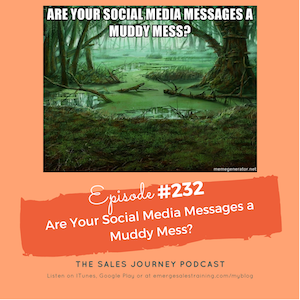Today we’re going to talk about effective ways to use social media to drive your business. My goal is for everyone listening to the podcast today that you’ll be able to create a strategy that makes sense for you and your business using social media, while still being a good human.
My question to you is: Have you ever thought about how your friends are impacted, being the good humans that they are, in following both your personal and business pages on Facebook or say Instagram?
They are being so supportive to follow your pages. They refer people to your business. Maybe they even invest in your products or services you offer, and in return, you want to be able to spread the word, not only about the great things happening in your personal life but then you share everything awesome happening in your business.
Do you know what happens to your friends’ feed when you do that? You take it over and you swamp it.
Why do you have separate pages if you’re going to post duplicate information in both?
Social media is a great way to get the word out about how awesome your products and services are. You can highlight the value of those products and services from your customers’ testimonials. It’s an awesome way to share results and to drive your business. But as soon as you start muddying the water through your social media with your personal page and business page, you start to get a swamp, and you really don’t want people to associate your business to a swamp. Well, I guess unless you provide swamp tours or something like that. We want to learn a little bit more about how we can keep these two types of accounts separate, personal and business.
According to an article I read in outboundengine.com, it is just as important when using social media for your personal use and your business page that you keep them separate. When you post something personal, it needs to stay on your personal page. And if it’s business related, it stays on your business page. Anyone that you have had any kind of business transaction with, you should invite them to your business page, including those that you may have a personal relationship with. If they’ve been a part of your business in any way, you want them to have access to all the great information that you post on your page. But on the same note, it’s not like you don’t want your friends to know what it is that you do, and so that’s where we have to find a balance. You just want to not aggressively promote your business on your personal page. Use discretion.
According to outboundengine.com, if you posted something on your business page that your network of friends will find useful, then you can share that post from your business page to your personal timeline to promote your business in a helpful way. But again, you need to use discretion when doing this. Not everything that’s on your business page is share-worthy. Hence, why you have two different accounts.
Now, I’m not saying not to invite your friends to your page. Invite away. If they accept, they will get all of those posts that you share on your business page, and by accepting, they’re making a conscious decision to like your page or not. So technically, they can’t get annoyed with you if they are following your page. So invite away.
Now, that might leave us with a question of thinking, okay, well what’s an acceptable protocol or strategy to take when effective actively working your social media accounts? Well, I have a few recommendations to help you with this.
First: When you do invite your friends, please do not take it personally if they don’t accept your invite. It isn’t about whether or not they like you or not. There are tons of reasons why your friends might decline. Maybe they honestly do not have a use for your products or service. Or maybe they follow too many pages already. Who knows. But it’s not that they don’t like you, so don’t take it personally and just be cool about it.
Second: When you are posting useful information on your business page, say on a featured product and how that can solve problems that your customers have, try to engage your audience by soliciting feedback and experiences from them. Because feedback that you get is going to appear on that participant’s page due to the request from you for responding. And in turn, do you know what happens on their social media accounts? Others that are following them, will spread the word about your business. In addition, it exhibits credibility on the products and/or services you offer, as well as in you. So solicit the feedback. Get them engaged.
Third: Posting any type of information on your business page, keep it simple. Do not use jargon the average person will not understand. Do not overstate your message. And then you want to ask yourself, can a fourth grader actually understand what I just posted? If your answer is no, then you posted too much. The more useful and simplistic your message is to your audience, the more effective it will be for your business. If it’s overwhelming information or jargon that they don’t understand, how can you expect it to be effective? Because they’re just going to skip right on past it.
Fourth: In your posts, always include how people can get in touch with you, identify specific products and/or services that you offer, and also highlight special events. This will allow whoever is following you to be able to actually connect with you. This also makes it easy for fellow colleagues in similar industries that are following you, or if you are following them, to connect with you. Making it easy for others to connect with you might help create partnerships or, create a referral network. That in itself can be amazing.
As you’re creating your protocol for your business, you want to make sure to:
- Note any feedback from your customers or friends as you’re doing this.
- You want to pay attention.
- Track the participation of your customers on your posts.
- Track your followers so that you can analyze if what you’re doing is driving the results you want with your business page.
- Are your followers going up, are they going down, or are they staying constant?
If you’re not getting the results that you’re looking from that, then you can refer back to the data that I just mentioned and be able to analyze and troubleshoot where adjustments might be needed in your new protocol for managing your social media accounts.
Some final thoughts. Always, Always consider your audience. It is recommended that you keep your personal views about religion and politics on your personal page. Keep it separate from your business page. You are going to have a diverse group of customers, and they will all have their own viewpoints and positions.
You want to minimize the risk of offending anyone on a professional level. Hence, it’s important to keep personal and business separate. One good rule to follow is that if you’re on your personal page, ask yourself this question. Would this be something that I would tell my customers? If the answer is no, then you’re on the right page. The same goes if you’re on your business page. Would this be something that I would tell my friends? Then no, then you’re on the right page, sticking to your business page.
Remember, when you’re thinking about driving the results with your business – your customers really care about what you have to say regarding what will save them time, money, and help solve their problems. Keep that as the focus. Remember, you do not want people to associate your business and your social media accounts tied to your business as a Big Muddy Mess.
I want to thank you very much for listening to the podcast today. To sign up for one of our free trainings on closing or recruiting, go to emergesalestraining.com/freetraining. If you enjoyed today’s podcast, be sure to share it with your friends and leave us a review in iTunes, because, well, it’s just not cool to not share. I hope you have a great day.

